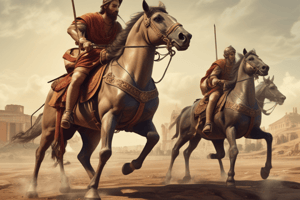Podcast
Questions and Answers
What was the original name of Augustus?
What was the original name of Augustus?
- Julius Caesar
- Marcus Aurelius
- Tiberius
- Gaius Octavius Thurinus (correct)
Which battle marked the end of Mark Antony's power and made Octavian the sole ruler of Rome?
Which battle marked the end of Mark Antony's power and made Octavian the sole ruler of Rome?
- Battle of Zama
- Battle of Cannae
- Battle of Actium (correct)
- Battle of Philippi
What was the period of relative peace and stability established during Augustus' reign called?
What was the period of relative peace and stability established during Augustus' reign called?
- Golden Age
- Roman Republic
- Pax Romana (correct)
- Pax Deorum
Which of the following is NOT a reform or achievement attributed to Augustus?
Which of the following is NOT a reform or achievement attributed to Augustus?
Who did Augustus adopt as his son and successor?
Who did Augustus adopt as his son and successor?
Which of the following is NOT associated with Augustus' personal life?
Which of the following is NOT associated with Augustus' personal life?
How long did Augustus reign as emperor?
How long did Augustus reign as emperor?
Where was Augustus buried?
Where was Augustus buried?
Flashcards are hidden until you start studying
Study Notes
Early Life
- Born on September 23, 63 BCE in Rome, Italy
- Original name: Gaius Octavius Thurinus
- Grandnephew and adopted son of Julius Caesar
Rise to Power
- After Caesar's assassination in 44 BCE, Octavian (later Augustus) vowed to avenge his death
- Formed the Second Triumvirate with Mark Antony and Marcus Lepidus to defeat Caesar's assassins
- Defeated Mark Antony in the Battle of Actium in 31 BCE, becoming the sole ruler of Rome
Reign
- Took the title of Augustus in 27 BCE, marking the beginning of the Principate
- Implemented the Pax Romana, a period of relative peace and stability that lasted for over two centuries
- Established the Praetorian Guard, a elite corps of soldiers who served as the emperor's personal bodyguards
- Reformed the Roman calendar, introducing the Julian calendar (later modified to the Gregorian calendar)
Reforms and Achievements
- Established a permanent police force and fire brigade for Rome
- Developed a network of roads, bridges, and public buildings throughout the empire
- Encouraged the arts, architecture, and literature, leading to a cultural flourishing
- Established the Roman Senate and reformed the Roman Constitution
Personal Life
- Married Livia Drusilla in 39 BCE, who became his partner in politics and life
- Had no biological children, adopting Tiberius as his son and successor
- Known for his simplicity, modesty, and moral integrity, earning the respect of the Roman people
Legacy
- Died on August 19, 14 CE, after a reign of 41 years
- Buried in the Mausoleum of Augustus, a grand tomb in Rome
- Remembered as one of the greatest emperors in Roman history, bringing peace, stability, and prosperity to the empire
Early Life
- Born in Rome, Italy on September 23, 63 BCE as Gaius Octavius Thurinus.
- Became grandnephew and adopted heir to Julius Caesar.
Rise to Power
- Vowed to avenge Julius Caesar's assassination in 44 BCE.
- Created the Second Triumvirate with Mark Antony and Marcus Lepidus to defeat Caesar's killers.
- Achieved victory over Mark Antony at the Battle of Actium in 31 BCE, solidifying his rule.
Reign
- Assumed the title of Augustus in 27 BCE, initiating the era known as the Principate.
- Launched the Pax Romana, which fostered over 200 years of relative peace in the empire.
- Founded the Praetorian Guard, an elite unit of soldiers devoted to protecting the emperor.
- Reformed the Roman calendar, leading to the establishment of the Julian calendar, paving the way for the Gregorian calendar.
Reforms and Achievements
- Instituted a permanent police force and fire brigade to enhance urban safety in Rome.
- Expanded infrastructure through a comprehensive network of roads, bridges, and public buildings.
- Promoted cultural advancement by encouraging the arts, architecture, and literature, resulting in a rich period of cultural flourishing.
- Reformed the Roman Senate and the constitution, outlining governance principles.
Personal Life
- Married Livia Drusilla in 39 BCE; she played a crucial role in politics.
- Adopted Tiberius as his successor, leaving no biological heirs.
- Known for simplicity, moral integrity, and modest living, significantly earning the public's respect.
Legacy
- Died on August 19, 14 CE after a 41-year rule.
- Interred in the Mausoleum of Augustus, notable for its grandeur.
- Regarded as one of Rome's greatest emperors for providing peace, stability, and prosperity.
Studying That Suits You
Use AI to generate personalized quizzes and flashcards to suit your learning preferences.




